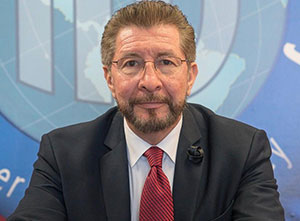Crisis in Ecuador is the breaking point to end the legitimization of crime

By: Carlos Sánchez Berzaín - 15/01/2024
Share:
The campaign to legitimize crime in the Americas has been so successful that now it is portrayed as a social, artistic, cultural, and political expression. Pressure groups, popular music, television soap-operas and series, movie productions, electoral campaign proposals, and positions of both the government and opposition, are expressed and act to favor the depenalization of crime, reduction of sentences, changes in cataloguing types of crime, the pardoning of serious crimes committed by criminals who seek and obtain impunity. All of these are part of the operations conducted by 21st Century Socialism and the crisis that Ecuador is a victim of and must now be the breaking point to end the legitimization of crime.
Legitimization means “to legalize, certify, validate, and recognize.” It consists of giving the condition of being legal or acceptable to something that is, and has been identified as, illegal, invalid, unacceptable, and criminal. The effects of legitimization originate from their promoters and their goal to accomplish their objectives in the judicial, social, economic, political arena. To legitimize something is to make acceptable something that is not, crime in normal conditions wherein legitimization is but another form of crime.
The legitimization of crime, interests criminals who have always sought to justify their anti-social actions with arguments of common interest, a false morality, or a political disguise. Criminals consistently attempt; to convert a conspiracy or an attack into a “revolution,” to transform an assassination into an act of “popular justice,” to present narcotics’ trafficking as an “antiimperialist fight,” to present political prisoners and torture as “defense of the revolution,” to attack and confiscate private property and call this “the recovery of the popular estate,” to label terrorism as “conflict,” to convert coca-leaf and cocaine into “defense of the mother land,” to label robbery as a “fight against poverty,” transform human trafficking and slavery into “internationalism,” to call criminal indoctrination as “education,” and more.
During the last 25 years, 21st Century Socialism -or Castrochavism- has produced and disseminated programs and narratives for the legitimization of crime, protection of criminals, and impunity. These are proven by the adverse effects of Colombia’s so-called Peace Treaties with the Revolutionary Armed Forces of Colombia (FARC) or “Havana’s Treaties” through which terrorists, narcotics’ traffickers, assassins, rapists of minors, and perpetrators of the worst types of crime, have been turned into Congressional Representatives, Senators, and politicians. All of these, while they persecute, imprison, or assassinate the reputation of all who defended society, promoted law enforcement, and the “rule of law” by falsely attributing against them the violation of human rights that criminals perpetrate that motivates the reaction by the Government and its institutions.
Argentina imprisoned thousands of military who had defeated urban terrorism while the perpetrators and their accomplices wielded power with corruption in the governments of the Kirchner’s is another example of the legitimization of crime. In Bolivia on behalf of the defense of the motherland (“Pachamama” a deity of the Quechua culture) they turned narcotics’ trafficking as the quickest means of political and social ascent and have transformed Che Guevara, an assassin and invader, into a fake hero. In Peru, the defeat of terrorists and narco-guerrillas of the Tupac Amaru Revolutionary Movement (MRTA) and the Shining Path, was turned into a “conflict.” In Mexico with Lopez Obrador and his “hugs and not slugs” (“abrazos y no balazos”), in Brazil with “Lava Jato” that took Lula da Silva to jail and involved many throughout the region in the most serious case of institutionalized corruption, presented as persecution. The entire region is full of these cases of legitimization of crime and criminals.
The legitimization of crime is preceded, accompanied, and backed by an aggressive and successful cultural attack ranging from popular music, television series, movies, social media, and the modification of educational programs and texts, wherefrom the conclusion is drawn that “crime pays” and “you can be a criminal and be a good person,” that “the criminal wins” and that “crime is a way to fight poverty and inequality.” This is how polls on the Latin American youth’s preferences show.
Officially, narco-States’ dictatorships of 21st Century Socialism have used and continue to use international forums and institutions and the representation of the countries they oppress, to proclaim “the failure of the war on drugs,” to present the international fight against crime as “interventionism actions of the U.S. Drug Enforcement Administration (DEA),” to request “the legalization of drugs,” to promote “peace agreements with guerrilla and narcotics’ trafficking groups.” In summary, they use these and any other means to “legitimize” crime and procure impunity, because dictatorships from Cuba, Venezuela, Bolivia, and Nicaragua are groups of Transnational Organized Crime who wield political power.
In Ecuador’s case, factual reality shows that during the ten-plus years of the Castrochavist dictatorship of former president Rafael Correa, the country was turned into a narco-State, a terrorists’ base, and a center for the organization and protection of crime. If Ecuador’s people and democracy again defeat dictatorial delinquency that is now operating as common delinquency, this will be the breaking point for the Americas to end the legitimization of crime.
*Attorney & Political Scientist. Director of the Interamerican Institute for Democracy.
Translation from Spanish by Edgar L. Terrazas
«The opinions published herein are the sole responsibility of its author».